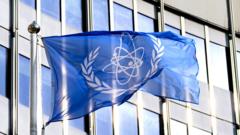Tensions rise as Iran vows to enhance its uranium enrichment activities following international condemnation.
**IAEA Declares Iran in Breach of Nuclear Obligations for First Time in Two Decades**

**IAEA Declares Iran in Breach of Nuclear Obligations for First Time in Two Decades**
The International Atomic Energy Agency's board of governors highlights Iran's non-compliance with nuclear commitments.
The International Atomic Energy Agency (IAEA) has made a groundbreaking decision, declaring Iran to be in violation of its nuclear non-proliferation obligations for the first time in 20 years. This announcement came from a vote by 19 of the board's 35 member countries, including the United States, United Kingdom, France, and Germany. The IAEA expressed concerns over Iran's failure to adequately address questions about undisclosed nuclear material and activities, along with its growing stockpile of enriched uranium, which is applicable for both reactor fuel and potential nuclear weapons.
Iran has characterized this resolution as politically motivated, stating that it plans to establish a new enrichment facility. A recent IAEA report indicated that Iran possesses a significant amount of uranium enriched to 60% purity, nearing weapons-grade levels, suggesting capacity for potentially creating nine nuclear bombs. Despite these accusations, Iran maintains that its nuclear efforts are entirely peaceful and has no intentions of developing nuclear weapons.
The 2015 nuclear deal, created between Iran and six powers, mandated that Iran restrict its nuclear endeavors under strict IAEA supervision in exchange for a reprieve from severe economic sanctions. However, the situation deteriorated when former President Trump exited the agreement in 2018, arguing it failed to prevent Iran from acquiring nuclear weapons. Since then, Iran has gradually escalated its nuclear program and breached several deal restrictions, particularly regarding enriched uranium production.
During the IAEA's recent meeting, three countries—Russia, China, and Burkina Faso—opposed the resolution, while eleven abstained and two were absent. The board expressed regret over Iran's non-cooperation with the agency's monitoring mandates. The IAEA stated that without proper verification of Iran's nuclear material and activities, it cannot assure the international community that Iran's nuclear program remains peaceful, raising flags that may require intervention from the UN Security Council.
Failure to comply with the Board's resolution could result in the snap-back of UN sanctions imposed under the 2015 agreement. European leaders urged Iran to take this opportunity to comply fully and transparently with its obligations regarding nuclear material. Conversely, the Iranian government has denounced the resolution and announced its intention to initiate a new uranium enrichment facility at a secure location and upgrade its enrichment technology.
Iran's Foreign Minister criticized the vote, asserting that it complicates ongoing negotiations with the U.S. regarding a new nuclear agreement. The upcoming discussions are pivotal, with past failures raising doubts about reaching a consensus. Meanwhile, increasing tensions in the Middle East are reflected in the U.S. advising diplomatic staff in the region to evacuate, coupled with Israel's readiness to conduct attacks on Iranian nuclear sites. Iran’s defense forces have promised to retaliate against any military aggression targeting their operations, thereby escalating the stakes in an already fraught situation.
Iran has characterized this resolution as politically motivated, stating that it plans to establish a new enrichment facility. A recent IAEA report indicated that Iran possesses a significant amount of uranium enriched to 60% purity, nearing weapons-grade levels, suggesting capacity for potentially creating nine nuclear bombs. Despite these accusations, Iran maintains that its nuclear efforts are entirely peaceful and has no intentions of developing nuclear weapons.
The 2015 nuclear deal, created between Iran and six powers, mandated that Iran restrict its nuclear endeavors under strict IAEA supervision in exchange for a reprieve from severe economic sanctions. However, the situation deteriorated when former President Trump exited the agreement in 2018, arguing it failed to prevent Iran from acquiring nuclear weapons. Since then, Iran has gradually escalated its nuclear program and breached several deal restrictions, particularly regarding enriched uranium production.
During the IAEA's recent meeting, three countries—Russia, China, and Burkina Faso—opposed the resolution, while eleven abstained and two were absent. The board expressed regret over Iran's non-cooperation with the agency's monitoring mandates. The IAEA stated that without proper verification of Iran's nuclear material and activities, it cannot assure the international community that Iran's nuclear program remains peaceful, raising flags that may require intervention from the UN Security Council.
Failure to comply with the Board's resolution could result in the snap-back of UN sanctions imposed under the 2015 agreement. European leaders urged Iran to take this opportunity to comply fully and transparently with its obligations regarding nuclear material. Conversely, the Iranian government has denounced the resolution and announced its intention to initiate a new uranium enrichment facility at a secure location and upgrade its enrichment technology.
Iran's Foreign Minister criticized the vote, asserting that it complicates ongoing negotiations with the U.S. regarding a new nuclear agreement. The upcoming discussions are pivotal, with past failures raising doubts about reaching a consensus. Meanwhile, increasing tensions in the Middle East are reflected in the U.S. advising diplomatic staff in the region to evacuate, coupled with Israel's readiness to conduct attacks on Iranian nuclear sites. Iran’s defense forces have promised to retaliate against any military aggression targeting their operations, thereby escalating the stakes in an already fraught situation.



















